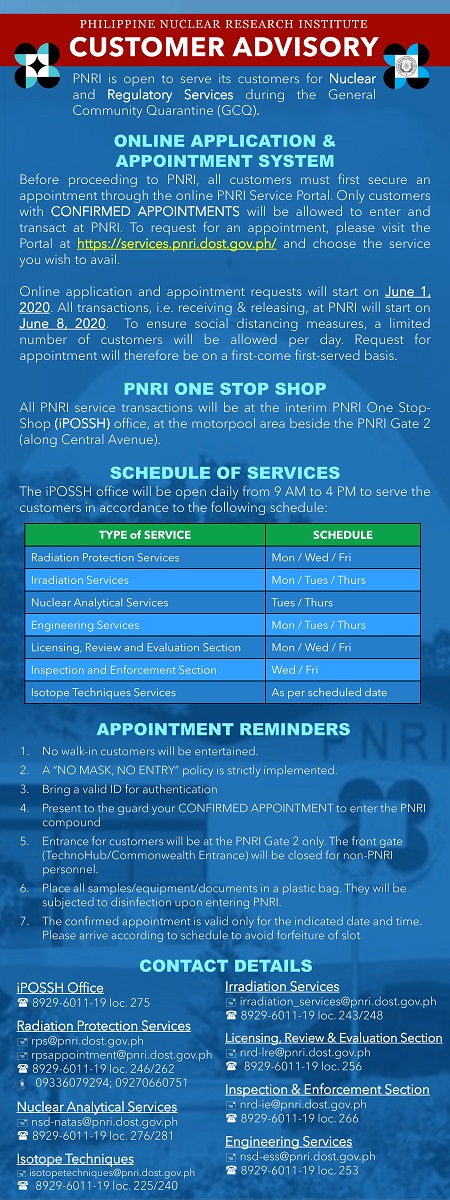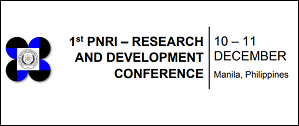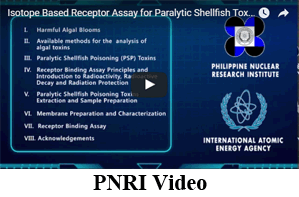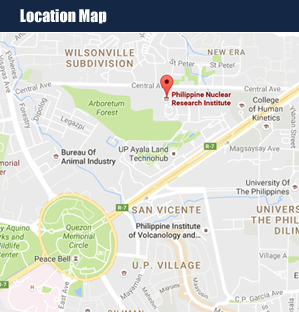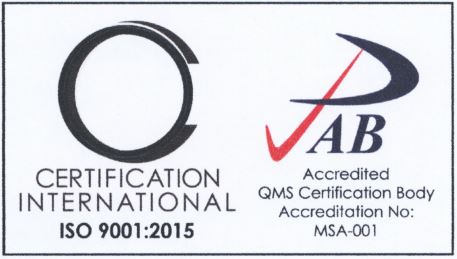- Details
Information Bulletin
|
Course Title: |
Seminar on Nuclear Science for Teachers (SNST) Former: Seminar on Nuclear Science for High School Science Teachers (SNSHSST) |
|
Duration: |
20 days (160 hours) |
|
Participation: |
For high school science, mathematics, physics, biology and chemistry teachers who are holders of a bachelor’s degree in education, science and engineering. A minimum of ten (10) participants is required to push through with the course. A maximum of thirty (30) participants will be accepted. |
|
Pre-requisite: |
A background on algebra, trigonometry, introductory calculus, general biology, chemistry and physics subjects. |
|
Course Goal: |
To provide science teachers with sufficient knowledge of the fundamentals of nuclear science and its beneficial application in different fields. Enable participants to contribute to the high school science curriculum by introducing suitable nuclear science topics and experiments in teaching physics, chemistry and biology. |
|
Course Objectives: |
At the end of this course, participants are expected to:
|
|
Nature and Scope of the Course: |
This course will consist of lectures, exercises, a workshop and examinations. The staff of the Nuclear Training Center (NTC), PNRI lecturers and guest lecturers will conduct the course. The participant’s performance in the seminar will be evaluated through the following:
A certificate of satisfactory completion will be issued to each participant who demonstrates satisfactory knowledge and skills of the subject matter presented. |
|
Requirements: |
(1) Application form with medical certificate; (2) Recommendation letter from principal or division superintendent; (3) Transcript of Records |
|
Course Content: |
Basic Nuclear Physics Nuclear Reactions Radioactivity and Radiation Quantities and Units in Radiation Protection Exercise on Nuclide Chart and Nuclear Data Interaction of Radiation with Matter Radiation Detection and Measuring Instruments Experiment on Radiation Detection Using an Improvised Cloud Chamber Biological Effects of Ionizing Radiation Basic Radiation Chemistry Basic Radiation Chemistry Experiment on Characteristics of Geiger-Muller Detectors Basic Principles of Radiation Protection The PNRI Regulatory Function Statistics of Counting Experiment on Statistics of Counting Concept of a Teaching Module Radiation Control and Handling Practices Radiation Shielding Experiment on Absorption of Gamma Radiation Security of Radiation Sources Safe and Secure Transport of Radioactive Materials Radiation Monitoring Exercise: Radiological Survey of a Radiation Facility Radioactive Waste Management Practices Emergency Planning, Preparedness, Procedures and Response Exercise on Emergency Drill Radioisotopes in Agriculture Experiment: Radiosensitivity of Planting Materials Food Irradiation Experiment on Fruit Irradiation Radioisotopes in Geological Studies Radioisotopes in Medicine Radioisotopes in Industry Radioisotopes in Environmental Research Radiation Processing Nuclear Energy for Power Generation Introduction to Reactor Technology: Overview of Different Nuclear Reactors in the World Neutron Interactions Experiment: Neutron Activation and Half life Determination Presentation of Teaching Modules Tour of PNRI Facilities
|
- Details
Information Bulletin
|
Course Title: |
Radiation Safety Refresher Course (RSRC) (Former: Radiation Safety Officer Refresher Course – RSORC) |
|
Duration: |
3 days (24 hours) |
|
Participation: |
For individuals involved in the use of radioactive sources in medical/ industrial field who need refresher training in radiation safety. A minimum of ten (10) participants is required to push through with the course. A maximum of thirty (30) participants will be accepted. |
|
Pre-requisite: |
Successful completion of an NTC Radiation Safety Course or equivalent and familiarity with the contents and application of the organization’s Radiation Safety Program |
|
Course Goal: |
To provide updates and periodic review and assessment of the RSO’s knowledge and understanding of radiation safety principles, regulations, company’s procedures and policies with respect to radiation safety and security practices and familiarization with the new regulations or requirements. |
|
Course Objectives: |
At the end of this course, participants are expected to be able to make recommendations for implementation of actions to achieve appropriate levels of safety in their own institutions or companies. |
|
Nature and Scope of the Course: |
This course will consist of lectures, exercises, a workshop and examinations. The staff of the Nuclear Training Center (NTC), PNRI lecturers and guest lecturers will conduct the course. The participant’s understanding of the subject matter presented will be assessed from reports and presentations submitted as scheduled during the course. A certificate of completion which reflects the number of hours of attendance will be issued to each participant. |
|
Requirements: |
(1) Application Form; (2) Recommendation Letter; (3) Photocopy of certificate of previous radiation safety course attended; (4)Training Fee of PhP 3,500.00 |
|
Course Content: |
Quantities and Units in Radiation Protection Dose and Shielding Calculation Dose Rate and Contamination Measurements Leak Testing of Sealed Sources Use of Radiation Monitoring Instruments Review of Applicable Regulatory Requirements/ Duties and Responsibilities of RSO Safety and Security Culture Lesson Learned From Incidents and Accidents Workshop: Lesson Learned From Accidents Safe and Secure Transport of Radioactive Materials Radioactive Waste Management Amendments and Revisions of Radiation Safety Program
|
- Details
Information Bulletin
|
Course Title: |
Radiation Safety Course – Commercial Sale Involving Radioactive Materials and Low Activity Sources (RSC-CL) (Former: Radiation Safety Course (2 Days) – RSC2D) |
|
Duration: |
2 days (16 hours) |
|
Participation: |
For individuals involved in the acquisition and possession of RAM and devices containing RAM intended for commercial sale and distribution; and those involved in the use of Category 5 radioactive sources, e.g. Ni-63 in ECD, XRF analyzers, calibration/standard sources used in research and education. A minimum of ten (10) participants is required to push through with the course. A maximum of thirty (30) participants will be accepted. |
|
Pre-requisite: |
Background on basic algebra and has finished at least 2 years in college. |
|
Course Goal: |
To enable participants to acquire sufficient level of understanding/ skills in the following areas: (1) basic radiation and radioactivity concepts; (2) fundamentals of radiation safety and security; (3) regulatory requirements; and (4) development and implementation of a radiation safety program applicable to their practice. |
|
Course Objectives: |
At the end of this course, participants are expected to:
|
|
Nature and Scope of the Course: |
This course will consist of lectures, exercises, a workshop and examinations. The staff of the Nuclear Training Center (NTC), PNRI lecturers and guest lecturers will conduct the course. The participant’s understanding of the subject matter presented will be assessed through the following:
A certificate of satisfactory completion will be issued to each participant who demonstrates satisfactory knowledge and skills of the subject matter presented. |
|
Requirements: |
(1) Application Form; (2) Recommendation Letter; (3)Training Fee of PhP 2,500.00 |
|
Course Content: |
The Atom Radioactivity Biological Effects of Ionizing Radiation Basic Principles of Radiation Protection Control of External Radiation Exposure Exercise: Use of Radiation Monitoring Instrument Applicable Parts of CPR Licensing Requirements/ Duties and Responsibilities of RSO Emergency Procedures during Transport of RAM Development of a Radiation Safety Program
|
- Details
Information Bulletin
|
Course Title: |
Radiation Safety Course – Radioactive Sources in Industrial Devices (RSC-ID) (Former: Safety in the Use of Nuclear Equipment and Devices – SUNED) |
|
Duration: |
5 days (40 hours) |
|
Participation: |
For individuals involved in the use of Category 3 and 4 radioactive sources in fixed and portable industrial devices, e.g. level gauges, conveyor gauges, spinning pipe gauges, thickness/fill-level gauges, moisture-density gauges and static eliminators. A minimum of ten (10) participants is required to push through with the course. A maximum of thirty (30) participants will be accepted. |
|
Pre-requisite: |
A background on basic algebra and trigonometry and/or has finished at least a bachelor’s degree. |
|
Course Goal: |
To enable participants to acquire sufficient level of understanding/ skills in the following areas: (1) basic radiation and radioactivity concepts; (2) fundamentals of radiation safety and security; (3) regulatory requirements; and (4) development and implementation of a radiation safety program applicable to their practice. |
|
Course Objectives: |
At the end of this course, participants are expected to:
|
|
Nature and Scope of the Course: |
This course will consist of lectures, exercises, a workshop and examinations. The staff of the Nuclear Training Center (NTC), PNRI lecturers and guest lecturers will conduct the course. The participant’s understanding of the subject matter presented will be assessed through the following:
A certificate of satisfactory completion will be issued to each participant who demonstrates satisfactory knowledge and skills of the subject matter presented. |
|
Requirements: |
(1) Application Form; (2) Recommendation Letter; (3)Training Fee of PhP 5,500.00 |
|
Course Content: |
The Atom Radioactivity and Radiation Radioactive Decay Calculations Quantities and Units in Radiation Protection Interaction of Radiation with Matter Biological Effects of Ionizing Radiation Radiation Detection and Measuring Instruments Basic Principles of Radiation Protection Radiation Control and Handling Practices Radiation Monitoring Exercise: Radiation Monitoring Development of a Radiation Safety Program Industrial Gauges and Basic Safety Requirement for Nuclear Gauges Leak Testing of Sealed Sources Categorization of Radioactive Sources Applicable Regulatory Requirements/ Duties and Responsibilities of RSO Security of Radioactive Sources Safe and Secure Transport of Radioactive Materials Applicable Radioactive Waste Management Practices Emergency Planning, Preparedness, Procedures and Response Presentation of Radiation Safety Program
|















